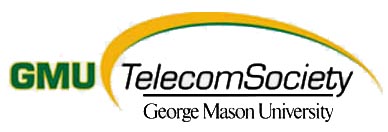|
|
Welcome back to all of you who are in the Telecom MA program, and welcome to the new students who are starting the program this Fall! This is always an exciting time at the University, a time of new beginnings and renewals that is filled with a combination of excitement and a little nervousness. It's hard for me to believe that we've been offering the MA in Telecommunications since 1990 and before that the MAIS in Telecommunications since 1987. The time seems to have flown by for me. I still get a Christmas letter from one of our very first graduates, Joe Batts, who keeps me up to date on what he's doing and reminds me that you are all not just students, but a part of our extended family here at George Mason. Joe was the force behind our Telecommunications Society which is planning a very impressive program for November. We'll have more details later. I hope you will plan to attend. The Telecommunications program is intentionally interdisciplinary because the field of telecommunications is itself interdisciplinary. It is designed for the telecommunications professionals, individuals who wish to make career changes, and others whose interests, talents, scholarly research, or professions bring them into contact with the world of telecommunications. When we designed the program we tried to make it different from any that already existed in American universities, and we vowed to remain innovative. Over the years, we have added and replaced core courses and elective courses in order to keep the program a vibrant one that mirrored the exciting changes in the field. This semester, we are proposing a number of very exciting changes which we hope will take effect by the end of the semester. We are proposing to reduce the elective Concentration requirement from 18 to 15 credit hours, thereby creating a 30 hour MA degree, instead of the current 33 hours. GMU's new MS in Telecommunications is proposing a similar change to 30 hours so that the two programs will be perfectly aligned with 15 hour core requirements and 15 hour elective Concentrations or Specialty Modules. Even more exciting, we are proposing to create 6 new Certificate Programs, three offered through the MA in Telecommunications, and three offered through the MS in Telecommunications. These can be pursued by students not wishing an MA or an MS, and they can also be taken as the elective Concentration for students in the MA or MS program. If you select one of the six Certificate programs and take the prescribed 15 credit hours, and then continue with an additional 15 credits in the Core requirement, you will get an MA degree and a Certificate, or an MS degree and a Certificate. Even more exciting for students in one or the other program, you will be able to cross over and take your elective/Concentration in the other program, getting a Certificate from the MS Program along with your MA degree, or getting a Certificate from the MA program along with your MS degree. We think this will offer all of our Telecom students in the College of Arts and Sciences, and in the School of Information Technology and Engineering a flexibility of choice and a cross-linking of programs that will provide a really special educational experience and an opportunity for students in each program to have "the best of both worlds." If these Certificate Programs are approved and the new concentrations are adopted for the MA in Telecommunications you will have the option to choose from 9 Concentrations instead of the current 6. These will be the current six: Educational Technology, Information Systems, International Telecommunications, Management, Organization, and Policy, Production Theory and Practice, Telecommunications Systems, and three new ones from the MS in Telecommunications: Network Technologies and Applications, Wireless Communications, and Telecommunications Systems Modeling. These new Concentrations will comprise three of the new Certificate programs. The other three, drawn from our current MA Concentrations, will be in International Telecommunications, Telecommunications Management, Organization, and Policy, and Telecommunications Production Theory and Practice. With the advice of their faculty advisors, students in both the MA and MS programs can choose any one of these six Certificate Programs to fulfill the 15 credit elective component of their MA or MS degree and get the degree plus the Certificate at graduation. Of course, students can still take any of the other elective Concentrations as always and get their MA or MS degree. These changes have been approved by the departmental faculty in both programs, but still need to wind their way through the larger College curricular committees and graduate councils. They are on a fast track, however, and I"ll keep you posted about their progress in future e-mails and/or newsletter articles. Dr. Jeremy Allnutt, who is my counterpart in the MS Program, and I are constantly listening to student feedback and trying to fine tune our programs so that they provide the best the university has to offer to our Telecommunications students. We welcome your suggestions as you go through the program. All the best for the new semester. Enjoy and learn. |
|

